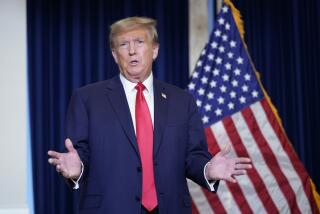Alito Backed Immunity for Wiretapping
Supreme Court nominee Samuel A. Alito Jr. said in a 1984 memo that he believed the president’s top lawyer should be shielded from being sued for approving illegal, warrantless wiretaps on the grounds of national security, an issue that has flared anew and could complicate his Senate confirmation next month.
As a Reagan administration lawyer, Alito faced a pending Supreme Court case that tested whether the U.S. attorney general could be held liable for having ordered an illegal wiretap.
His defense of President Nixon’s attorney general, John N. Mitchell, came to light in a memo released Friday by the National Archives.
In 1970, Mitchell ordered the FBI to wiretap the telephone of a Haverford College physics professor who was a member of a radical anti-Vietnam War group. The FBI believed the group had plans to blow up tunnels under the nation’s capital and possibly to kidnap then-national security advisor Henry A. Kissinger.
The alleged plans and the wiretap apparently came to nothing. But Keith Forsyth, a man whose conversations with the professor were intercepted, learned of the wiretap and later sued Mitchell for violating his constitutional rights.
He relied on a 1972 Supreme Court ruling that rejected Nixon’s claim that the president had the power to order warrantless wiretaps to protect national security. In a unanimous decision, the justices said the 4th Amendment forbade wiretaps without a judge’s approval, even when there were domestic threats to the nation’s security. The court noted it was not ruling on the “president’s surveillance power with respect to the activities of foreign powers, within or without the country.”
Armed with that ruling, Forsyth sued and won before a federal judge and a U.S. appeals court. However, the Supreme Court agreed to hear Mitchell’s appeal in 1984 to decide whether an attorney general had immunity from being sued.
Earlier, the high court had ruled that the president was absolutely immune from being sued for his decisions while in office. But the justices refused to extend that immunity to the president’s aides and advisors. So the status of the attorney general, the nation’s chief law enforcement officer, was unclear.
“I do not question the attorney general should have this [absolute] immunity,” Alito wrote in a memo to the solicitor general. But for “tactical reasons,” he urged the administration to try a more moderate approach. He cautioned that the high court is wary of shielding government officials from all liability when they blatantly violate the rights of Americans.
Alito’s advice was ignored, and Reagan’s lawyers urged the high court to shield future and former attorney generals from all liability for their actions. It would “pose a serious threat to the independence of the attorney general” if he could be sued, the administration argued.
But, as Alito predicted, the Supreme Court rejected that argument and wrote a strong opinion stating that the attorney general was not above the law.
“The danger that high federal officials will disregard constitutional rights in their zeal to protect the national security is sufficiently real to counsel against affording such officials an absolute immunity,” wrote Justice Byron R. White in Mitchell vs. Forsyth.
The attorney general “may on occasion have to pause to consider whether a proposed course of action can be squared with the Constitution and laws of the United States. But this is precisely the point,” White added. “He should be made to hesitate.”
However, Mitchell escaped liability because the justices concluded that the law was not clear in 1970 when he ordered the wiretap.
Nonetheless, the ruling in his case stands as the law today and means that a U.S. attorney general can be held personally liable for actions that violate the law.
Several Democratic senators said Friday that Alito’s memo raised new concerns. They said they planned to question him about his views on presidential power and wiretapping.
“At a time when the nation is faced with revelations that the administration has been wiretapping American citizens, we find that we have a nominee who believes that officials who order warrantless wiretaps of Americans should be immune from legal accountability,” said Sen. Edward M. Kennedy (D-Mass.).
But Sen. John Cornyn (R-Texas) said it was a “real stretch” to make a connection between the Nixon-era wiretaps of domestic calls and the “current discussion of terrorist surveillance” by the National Security Agency.
President Bush confirmed last week that he had ordered the NSA to intercept the “international communications” of persons in the U.S. who had “known links” to terrorists abroad. He said his goal was to detect terrorists who might be operating within the nation’s borders.
The president and Atty. Gen. Alberto R. Gonzales said the actions were legal, even though they bypassed the special U.S. court that issues warrants for electronic surveillance in matters involving foreign spies and international terrorists.
Also released Friday was a June 1986 memo in which Alito, then a deputy assistant attorney general, said Supreme Court justices should be permitted to make money writing books as long as the books did not deal with issues before the court.
The Supreme Court member in question was then-Chief Justice William H. Rehnquist, who died in September.
In 1984 and 1985, Rehnquist reported on his financial disclosure forms that he had been paid a total of $27,000 by William Morrow & Co. for a book, as Alito described it, “about his experience as a Supreme Court justice.”
“We assume that Justice Rehnquist is working on the book on his own time, without the assistance of court staff or facilities,” Alito wrote.
More to Read
Get the L.A. Times Politics newsletter
Deeply reported insights into legislation, politics and policy from Sacramento, Washington and beyond. In your inbox three times per week.
You may occasionally receive promotional content from the Los Angeles Times.








